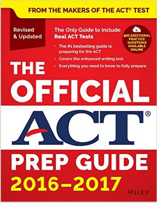 As the ACT has come into its own over the past 10-20 years as a fully recognized college admissions test alongside the SAT, students increasingly weigh both of these exams to assess which one may be better suited for them, sometimes opting for both. Preferences (and rumors) abound, of course: “There are too many trick questions on the SAT math!” or “I'd take the ACT, but the science section is a deal-breaker!” While these sentiments may (or may not) be true, depending on the student, what's certainly true is that they contribute heavily towards apprehension over which test to take! There is, however, one section that is nearly identical on each test, and offers a way to kill two birds with one stone in your college admission exam prep. That's the grammar/rhetoric section, referred to as the “English” section in the ACT, and the “Writing and Language” section on the SAT. CollegeXpress offers an in-depth analysis of the similarities and differences between the two tests.
As the ACT has come into its own over the past 10-20 years as a fully recognized college admissions test alongside the SAT, students increasingly weigh both of these exams to assess which one may be better suited for them, sometimes opting for both. Preferences (and rumors) abound, of course: “There are too many trick questions on the SAT math!” or “I'd take the ACT, but the science section is a deal-breaker!” While these sentiments may (or may not) be true, depending on the student, what's certainly true is that they contribute heavily towards apprehension over which test to take! There is, however, one section that is nearly identical on each test, and offers a way to kill two birds with one stone in your college admission exam prep. That's the grammar/rhetoric section, referred to as the “English” section in the ACT, and the “Writing and Language” section on the SAT. CollegeXpress offers an in-depth analysis of the similarities and differences between the two tests.
COllege Admissions News and ACT / SAT Strategy
Stay current with the latest undergraduate college admissions news and proven ACT and Digital SAT strategies.
Posts about ACT (2):
The PSAT: Your First Step to SAT & ACT Success
A Guide To ACT Scoring
Understanding how the ACT is scored is one of the most fundamental aspects of taking the test. Before even stepping foot into the classroom on test day, knowing the scoring for the ACT can help you to outline your studying and set realistic score goals as you are planning for the big day. Let’s dive into our guide for ACT scoring and what you should know right now:
A Guide to Tackling the ACT Reading Section
Reading four lengthy passages and answering 40 questions in a short timespan of 35 minutes can seem overwhelming, especially if you are not familiar with the ACT Reading section and the many tricks that the ACT writers try to confuse test-takers with. However, a little review and practice of a few simple test-taking strategies will give you the skills and confidence necessary to tackle the ACT Reading section.
ACT Science: Sifting Out What Matters (and what doesn’t)
The ACT Science section has a rather misleading name. Perhaps a better name would be the ACT Reading Section Part 2: Science Concepts. The exam requires no prior knowledge of scientific content or concepts. Instead, students are required to interpret data graphs, what the scientific method is and how scientific theories disagree from each other. These are concepts taught in every high school in the country. The ACT is a standardized exam that must provide a level playing field for all applicants, from all demographics across the United States. As such, it may be comforting to know that advanced science concepts such as DNA transcription and translation or the Hardy Weinberg Equilibrium won’t be tested. To succeed on this portion of the exam, exposure to ACT Science questions and practice solving them is critical. The following is an important tip to succeeding on the ACT science section:
Designing an ACT Study Plan? Here are our Recommended ACT Study Materials
 When designing an ACT study plan, one key question is “what materials will I use?” Luckily, the most effective material is also the most inexpensive (more on that later).
When designing an ACT study plan, one key question is “what materials will I use?” Luckily, the most effective material is also the most inexpensive (more on that later).
To begin, it’s helpful to ask yourself one basic question: am I fundamentally comfortable using online materials or not? There are many web-sites and “apps” available to help you prepare for the ACT. But for some people, plain old paper and pencil is still their preferred way to learn. I tend to encourage students to at least consider an online approach, since it’s generally very convenient and because many online resources are “adaptive,” meaning they give you suggested practice content based on how you’ve performed on previous practice problems to build on your strengths and address your weaknesses. But, if an online approach just isn’t for you, don’t force it.
